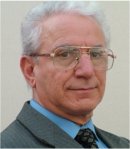|
Plenary
Lecture
Thermoelectric Technology as Renewable Energy Source for
Power Generation and Heating & Cooling Systems

Professor Noel Y. A. Shammas
Faculty of Computing, Engineering and Advanced
Technology
Staffordshire University
UK
E-mail:
N.Y.A.Shammas@staffs.ac.uk
Abstract: This paper will review the latest research
and current status of thermoelectric power generation,
and will also demonstrate, using electronic design,
semiconductor simulation and practical laboratory
experimentation, the application of thermoelectric
technology for use in energy harvesting and scavenging
systems. Ongoing research and advances in thermoelectric
materials and manufacturing techniques, enables the
technology to make a greater contribution to address the
growing requirement for low-power energy sources
typically used in energy harvesting and scavenging
systems. The concept of using thermoelectric technology
to generate electrical power from waste heat in a system
has been considered for some time, although the
technology is often overlooked in discussions
surrounding renewable energy sources. This paper will
discuss how the natural environment presents a number of
opportunities to utilise this technology as a renewable
energy source, including the use of thermoelectric
technology to generate electrical power from naturally
occurring geothermal heat. The paper covers basic
thermoelectric theory, construction and operation of
thermoelectric devices; the main advantages and
disadvantages; and highlights several current and new
applications for thermoelectric power generation. The
application of this technology for use in energy
harvesting systems is discussed, along with suitable
electronic signal conditioning techniques; boost
converters; DC to DC converters; and the storage of
electrical energy in supercapacitors. This discussion
then leads to the design, construction and testing of a
thermoelectric energy harvesting system, with typical
test results for thermoelectric power generation
presented. The paper then focuses on current research
into improving the power generation properties of
thermoelectric modules, and a novel approach using
semiconductor simulation techniques is presented. A
novel three dimensional model of a thermoelectric device
has been created using the Technology Computer Aided
Design (TCAD) semiconductor simulation package, with
typical simulation results for thermoelectric power
generation presented.
Brief Biography of the Speaker:
Noel Shammas is currently a Professor of
Microelectronics and Solid-State Semiconductor Devices
in the faculty of Computing, Engineering and Advanced
Technology, Staffordshire University. He received the
M.Sc and Ph.D degrees from Salford University in 1972
and 1975 respectively. Since then he lectured and
researched at different universities and industry (GEC).
Research work is primarily focused on Semiconductor
Devices which includes mainly Power diodes, Light
Emitting Diodes (LED’s), Insulated Gate Bipolar
Transistors, Thyristors, and Energy Harvesting Devices.
Other related areas of research work includes Power
Module Packaging technologies (Both Conventional
Press-pack and Smart pack designs) and Series/Parallel
operation of high power semiconductor devices and their
interaction with external circuits.
Professor Shammas has extensive experience in both
experimental and theoretical research work and is
recognised internationally for his significant
contribution to research in the field of Semiconductor
Devices. He has published over 120 journal and
conference research papers as well as several invited
Keynote and Plenary Lectures, and has held several
research grants from funding councils, Advantage West
Midland (AWM), as well as from industry. He is a regular
reviewer for many journals (including IET Proceeding
Electronic devices and systems, IEEE Transactions on
power electronics, and Microelectronic Reliability) and
international conferences (including the European Power
Electronic conference - EPE, Microelectronic conference
- MIEL, Universities Power Engineering Conference-UPEC,
International Symposium Power Semiconductors-ISPS,
etc…). He is a member of scientific committee for many
international conferences (including MIEL, EPE, WCE,
WSEAS, and Microtherm) and a steering committee member
for EPE, UPEC, and ISPS international conferences. He is
also a book reviewer for Prentice Hall International and
McGraw Hill.
|
